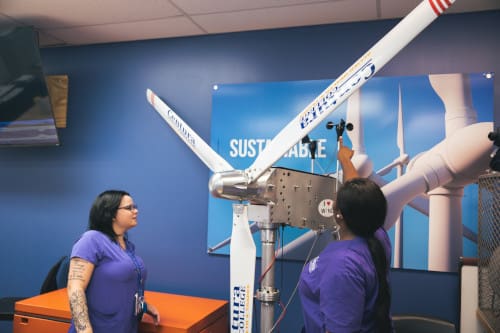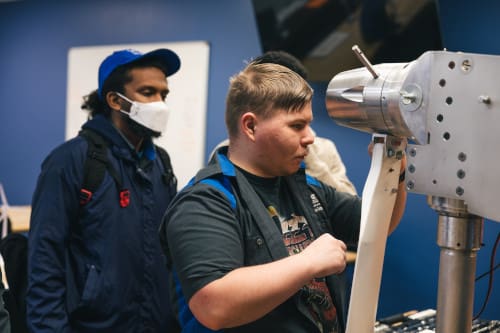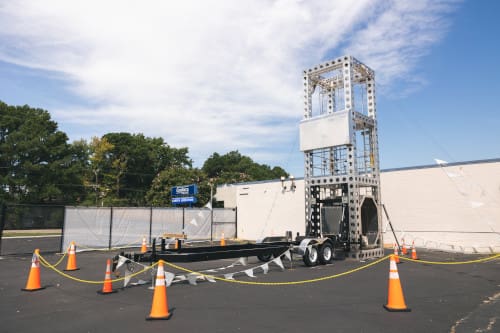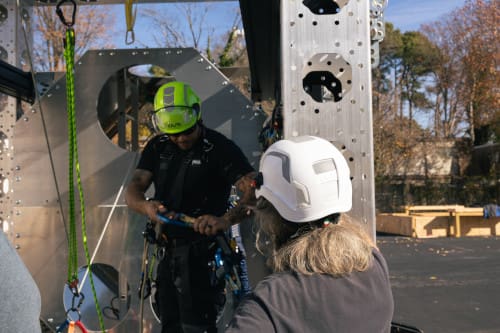You might have heard of a wind turbine technician – or more likely, seen them climbing one of those vertical towers. But what exactly are wind turbines and how do they benefit the world? And what kind of skills do you need to become a wind energy technician and is there training can help prepare you? In this blog, we will explore wind turbine technical training, its importance, benefits, and the next steps to create a career in the industry.
What are Wind Turbines?
Wind turbines are large structures that convert wind energy into electricity. According to the Department of Energy, this is made possible by technology that uses an aerodynamic force from the rotor blades, which work like an airplane wing or helicopter rotor blade. The air pressure on one side of the blade then decreases when wind flows across. A wind turbine system is much more cost efficient as compared to traditional electronic energy.

Studying to become a Wind Turbine Technician
Wind turbine technician training involves Global Wind Organization (GWO) formal training in addition to the understanding of basic safety concepts. The majority of the GWO training, Basic Safety Training (BST), Basic Technical Training (BTT), and Combined Space Entry & Rescue (CSER), covers how to safely work in a wind turbine environment. Given the height of these structures, it is critical that all hazards are understood by the technician, especially given a transition from a different type of career field into the wind industry. This also allows for more time to be devoted to learning the specifics of the job and acquiring the skills needed for career success.

Enrolling in a Wind Turbine Training Program
To become a wind turbine technician, students will generally earn a certificate from a certified trade school rather than pursuing an associate degree or a four-year degree. This type of concentrated program, which requires a high school diploma or GED to enroll, will equip students with the skills they need to learn about not just the wind industry, but electric standards overall. The technical training program takes approximately a year to complete for students enrolled full-time. Financial aid is also usually available.
“At Centura College, our wind energy program utilizes technicians from the field who have four-plus years of experience to ensure that students are gaining the best and most current knowledge,” said Tracey Butts, a wind turbine instructor at Centura College. “Our students are certified to work offshore and by utilizing the Maritime institute, we can get our students the additional certifications needed to offer them this type of employment.”
What a Hands-On Program Covers
The areas of study included in a wind turbine technician program cover broad knowledge to prepare students for their new career. This practical, hands-on training aids them in helping to better understand how these machines work including safety measures. This includes:
Climbing wind towers
Electrical theory
Maintenance of electrical circuits AND electrical test equipment
Alternating current and three-phase systems
Circuits breakers and fuses
Switching devices
Wind turbine power distribution systems
Fasteners and torquing, bearings, lubrication, and hydraulic systems


The Skills that Help Students Succeed as Wind Turbine Technicians
A certificate program found at career schools like Centura College provides students with the opportunity to complete Maritime based certification(s), the National Center for Construction Education & Research (NCCER) Introduction to Power Industry and Wind Turbine Maintenance Level I certification(s). There’s also the critical CPR/Basic Life Support training which includes first aid. Subject matter like safety at heights, becoming a certified climber and rescue at heights are critical to understand in the wind turbine industry.
Whether training for a utility company or as a general contract technician, advantages are similar with the number one priority being safety. A company can help ensure that all its installation technicians are effectively completing their work when safety protocols are followed. Effective and thorough training will ultimately decrease accidents on the job as well.
“Additional required soft skills of a wind energy technician are, good communication, good listening, the ability to be self-sufficient, and a willingness to learn,” said Butts. “If you can learn and work in a team, you can be a technician.”
The Benefits of Wind Farms
Earlier we discussed the benefits of wind energy technology, but let’s dive deeper into its environmental impact. According to Butts, it is true that the initial construction, fabrication, and transportation of towers can be harmful to the environment and generate high production costs. However, once up and running, the wind turbine can pay itself off, as in it can produce more than what it took to put it up. Economic benefits also are plentiful including new jobs being created across the country at these sites as well as the continued need for work to maintain wind turbines at production sites.
Career Opportunities in the Wind Energy Sector
Career opportunities for wind power technicians are extremely favorable. According to the Bureau of Labor Statistics’ Occupational Outlook Handbook , wind turbine technician employment is projected to grow 44% over the ten-year period of 2021 to 2031. In demand, the industry growth is much faster than the average for all other occupations.
Butts stated the types of jobs in the industry are endless, and could range from a technology worker at a tower to an engineer who works at a computer, or even employment at the Radar Operations Center (ROC). There’s also the opportunity to become an instructor and invest in the next generation of career training and programs being developed in the wind turbine industry.
How Much Does a Wind Turbine Technician Earn?
While salary does vary for those working in the wind energy industry, the average as reported in 2021 by the Bureau of Labor Statistics, was upwards of $56,000. Overtime work along with additional certifications earned can also vary the pay grade. The ever-changing wind turbine tower models offer the opportunity to learn new skills that make wind technicians even more in demand.
“The amount of growth that’s possible in the energy industry all depends on the person and as long as you stay focused and complete the checklist from one position to another, you will succeed,” said Butts. “The career opportunities are plentiful and there are so many companies that like to do promotion within for those who choose to become a wind turbine technician, so you’ll always have a route of what you can do next.”
The Future of the Wind Energy Industry
While wind energy continues to evolve in terms of technology and beyond, the industry itself is also cementing its favorable standpoint in the jobs world. Many companies continue to purchase wind credits to offset their emissions especially as global warming becomes a deepening concern across the globe.
Said Butts, “I feel everyone wants a future in which we work with the earth to create our energy not destroy it or output all these emissions – and wind energy technology can help in offering that.”

